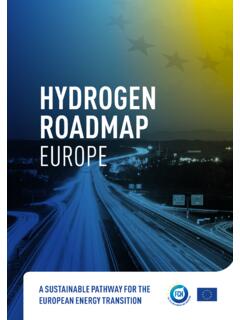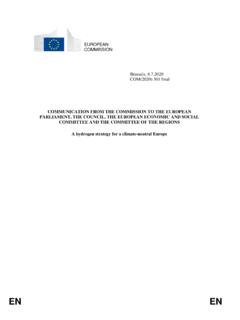Transcription of THE CRISIS IN UKRAINE: RooT CAUSES AND - vid-1.rian.ru
1 THE CRISIS IN ukraine : Moscow, September 2014. root CAUSES AND. scenarios FOR THE FUTURE. Valdai Discussion Club Report ISBN 978-5-906757-07-4. Introduction 3 scenarios 57. The Ukrainian Economy 58. The Root CAUSES 6 in the Near-Term of the CRISIS Can ukraine Retrace its 62. Steps? Internal CAUSES 7 scenario 1 . The Military 65. Operation in Southeast Historical CAUSES 7 ukraine Turns into a Civil War Political CAUSES 17. Scenario 2. Federalization, 68. Economic CAUSES 26 or a Dayton for ukraine The Role of External Players 34 Scenario 3. ukraine 's 70. and Factors Disintegration The Players' Positions 35 Best-case Scenario 71. Russia and the West: the Ukrainian 38. Clinch An Information War: a New Type 44. of Warfare Civil War and 46. the End of the Revolution War in Southeastern ukraine 47.
2 Presidential Elections: 52. End of the Revolution and Onset of the Oligarchs' Rule This report was prepared by the Valdai International Discussion Club based on contributions from Andriy Blinov, Project Director, League for Financial Development ( ukraine ); Kost Bondarenko, Director, Ukrainian Policy Institute ( ukraine ); political analyst Dmytro Vydrin, Deputy, Verkhovnaya Rada (Ukrainian parliament) of the fifth convocation ( ukraine ); Eduard Zolotukhin, Director, Research & Branding Group ( ukraine ); Rostislav Ishchenko, President, Center for Systems Analysis and Forecasting ( ukraine ); social ana- lyst Yevgeny Kopatko, Founder, Research & Branding Group ( ukraine ); Fyodor Lukyanov, Presidium Chair, Council on Foreign and Defense Policy, Editor-in-Chief, magazine Rus- sia in Global Affairs (Russia); Sergei Mikheyev, Director General, Center for Current Poli- tics in Russia (Russia); Mikhail Pogrebinsky, Director, Kyiv Center of Political Studies and Conflictology ( ukraine ); Konstantin Simonov, Director General, National Energy Security Fund (Russia), as well as materials from roundtable discussions in Berlin: Alexei Vla- sov, Executive Director, North-South Center for Political Studies (Russia); Arnaud Dubien, Director, French-Russian Observatory analytical center (France); Yevgeny Minchenko, President, Minchenko Consulting Communication Group (Russia).
3 Gerhard Mangott, Professor of Political Science, University of Innsbruck (Austria); Nicolai Petro, Professor of Politics, University of Rhode Island (USA); Alexander Rahr, Research Director, German- Russian Forum (Germany); Hauke Ritz, journalist and writer (Germany); Hans-Friedrich von Ploetz, Ambassador Extraordinary and Plenipotentiary, Ret. (Germany); Reinhold von Ungern-Sternberg, Director, Kirovsky Zavod Berlin Office (Germany); Christoph Hoerstel, Director, Political Consultant, government, public relations and business consultancy Hoerstel Networks (Germany); Martin Hoffmann, researcher, German-Russian Forum (Germany); Gabor Stier, foreign policy commentator, foreign policy editor, Hungarian con- servative daily newspaper Magyar Nemzet (Hungary); Dietmar Stuedemann, researcher, German-Ukrainian Forum (Germany); and in Paris: Pavel Baev, Professor, Peace Research Institute Oslo (Norway); Justin Va sse, Director, Policy Planning Staff at the French Minis- try of Foreign Affairs; Thomas Gomart, Vice President for Strategic Development, French Institute of International Relations, IFRI.
4 Isabelle Dumont, Deputy Director, Continental Europe Directorate, Head, Office for Russia and Eastern Europe, Foreign Ministry of France;. Etienne de Durand, Director, Center for Security Studies, French Institute of International Relations, IFRI; Antoine d'Evry, Researcher, Center for Security Studies, French Institute of International Relations, IFRI; Volodymyr Yermolenko, political analyst ( ukraine ); Tatiana Kastueva-Jean, Head of the Russie-NIS Center (Russia-CIS), French Institute of Internation- al Relations, IFRI; Veronika Krasheninnikova, Head of the Center for International Journal- ism and Research, Rossiya Segodnya International Information Agency; Vladimir Lepekhin, Director, EurAsEC Institute (Russia); Philippe Lefort, former EU Special Representative for the South Caucasus, (France).
5 Pierre Morel, former EU Special Representative for Central Asia, Director, Pharos Observatory (France); and Nicu Popescu, Senior Analyst, EU Institute for Security Studies (Romania). Project Director Pavel Andreev, Executive Director, Foundation for Development and Support of the Valdai Discussion Club. Associate Editor Gayaneh Seiranyan, PhD (History). 0. The CRISIS in ukraine : Root CAUSES and scenarios for The Future INTRODUCTION. 3. The CRISIS in ukraine has become a tragedy, as is evidenced by the thousands of people who have been killed, and hundreds of thousands of refugees. It will alter the future of ukraine , Europe, Eurasia and possibly the world. The CRISIS began in the fall of 2013 as a public response to the authorities' ill-advised policy and the greed of the elite.
6 But clumsy assistance provided by concerned partners . turned the CRISIS into a coup, a power grab and subsequent chaos, which quickly spread across ukraine , one of Europe's largest countries. Months later, ukraine is still fighting a bloody civil war and humanitarian catastrophe amid an increasingly destructive economic CRISIS . ukraine will never be the same again. No one, neither Ukrainians, nor Russia nor the West, needs the old ukraine . Ukrainians don't need it because it didn't provide them with the necessary development, a better quality of life or national unity. As for Russia and the West, they have no need for a ukraine that plays with, and sometimes even trades on, the contradictions that exist between them. ukraine has been a major sore spot for Europe since the end of the Cold War.
7 It was an ulcer that reopened many times as a result of domestic issues, or for lack of attention, or at the prompting of external actors, souring Russia's relations with its European partners. A settlement in ukraine offers a unique opportunity to heal this ulcer, this last open wound of the Cold War era, and also to bring clarity to the idea of a common geopolitical and geo-economic Euro-Atlantic and Eurasian space, from Lisbon (and possibly from Vancouver) to Vladivostok. The parameters of the settlement in ukraine will likely offer a projection of the future rules of coexistence and cooperation in the world. Will it be a world of honest, fair and constructive competition, or will the phantoms of the zero-sum game continue to haunt us? This report in no way aims to seal ukraine 's fate behind its back.
8 It is based on contributions from Ukrainian experts, complemented with documents provided by Russian experts and the main points presented by European and American participants in roundtable discussions that the Valdai Club and its partners held as part of this report's preparation. We are not aspiring to create a panacea. We offer only an objective analysis of the events that led to the 2014 CRISIS in ukraine and outline possible parameters of an 4. The CRISIS in ukraine : Root CAUSES and scenarios for The Future agreement to help create conditions for the peaceful and positive development of ukraine as part of the Eurasian space from the Atlantic to the Pacific coast. This should be in the interests of all responsible parties. The settlement parameters we suggest are concrete and practicable, given political will.
9 We hope that this report will help readers, including for research as well as practice, understand the essence of developments, and consequently formulate their position on the situation in ukraine and the role of Russia and the West. Pavel Andreev Project Director, Executive Director of the Foundation for Development and Support of the Valdai Discussion Club 5. THE root CAUSES . OF THE CRISIS 1. 6. Internal CAUSES The current CRISIS in ukraine can be rightfully territories. Soviet power was based on purely thought of as a systemic CRISIS of two models: pragmatic and sometimes openly manipulative post-Soviet Ukrainian statehood and the post- considerations, as it merged particular territo- unipolar world. There are numerous CAUSES of ries and drew new internal borders.
10 Moreover, this CRISIS , which clearly has political, economic, often during the Soviet times, the decisions had social, and cultural dimensions to it. We will try nothing to do with common sense, and were to identify the most significant ones. based not on the ideas of harmonious creation, but rather, the ideas of conscious destruction of the territorial communities that existed in the Historical CAUSES pre-Soviet period. For example, Soviet authorities wanted to A failed state balance out the Ukrainian peasantry with the Although it has become commonplace to call industrial workers from Novorossia, and to do ukraine a failed state, this does not mean the so, they merged the territories of what is now actual historical CAUSES underlying its current eastern and central ukraine .






